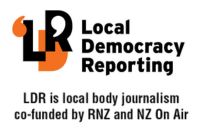'Overwhelming support' for Ashburton's standalone water plan

Ashburton's community is backing a standalone business unit for the future delivery of the district’s water services, according to submissions.
The Ashburton District Council is poised to adopt the in-house, ring-fenced delivery model for its Water Services Delivery Plan on Wednesday, which will be lodged with the Department of Internal Affairs by September 3.
Although the standalone business unit was deemed the cheaper option, the cost of water services is expected to rise due to tougher water regulations, a councillor warned.
At last week’s submission hearing and deliberations, councillors covered the 234 submissions, which showed 88% support for the council’s proposed delivery model.
Deputy mayor Liz McMillan said the key message from the community was “local control and wanting the council to continue the good work that we have been doing”.
Around 9% of submitters favoured the alternative option of establishing a water services council-controlled organisation (WSCCO), while the remaining 3% suggested another option or didn't specify a preference.
Councillor Russel Ellis said the heavy weighting towards the proposed option was “probably one of the clearest lots of public submissions I’ve seen in my time here”.
One of the supporters was former district councillor Stuart Wilson, who was the lone submitter presenting in person at the hearing last week.
“It was important to show support for the option the council decided was the best for our district.
“Sometimes, through thinking the obvious choice will be accepted by rate payers can mean that the opposing view can activate themselves out of proportion to public opinion.
“The overwhelming support for the standalone business unit is an emphatic endorsement of your option that the council favoured.”
He also advised the council that he backs the introduction of water meters to all properties connected to council supplies.
“Not only to monitor usage but to charge according to usage.”
There has been a suggestion that it will become a legislative requirement in the future, “so the sooner this is implemented in this district, it will be advantaged to comply with legislation and to ensure water is used responsibly”.
In the deliberations, McMillan noted that the council’s position is to use water meters only or leak detection.
“[There's] no plan for charging for water, but we could be directed otherwise going forward.”
Ellis wanted it to be clear that while a standalone business unit was deemed the cheaper option, the services wouldn’t be cheaper.
“With the regulations that are changing, there will be increased costs.”
The council’s standalone business unit will need to meet stricter requirements, including regular reporting to the Commerce Commission, which will ensure that water service charges are fair and sustainable, and ongoing renewals and maintenance are appropriate.
By Jonathan Leask

